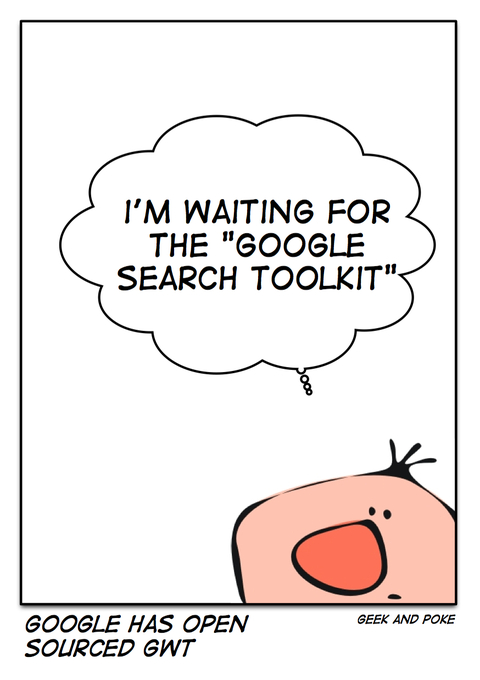
David Berlind and Dan Farber ask about 10 reasons how to know it's Web 2.0 (and not just 1.0).
That's my humble contribution.
Googles Minimal Patents

Google has patented the design of its search page (see Dana Blankenhorn).
Closed Google
Google has open sourced GWT (see Ed burnette). That's great.
Despite this fact:
Google is the "Closed Source Company".
The most important platform on the web (1.0 or 2.0) is Google Search.
All the web-based companies depend on it. It's as important for them as the NYSE for a public company.
But imagine NYSE would delist a company without giving any statment.
Google can do this (and has done it), as it's search algorithms are completely closed.
Borg 2.0

Again a post about the digital maoism (from Nicholas Carr resp. his source Steven Johnson).
Steven Johnson says that "going solo" is better than "a swarm of connected human minds" in order "to come up with a good idea".
Is it a "swarm of connected human minds" what we can see on sites like Wikipedia?
In the pre-2.0-days we would have called it discourse.
No Shit No Art
Nicholas Carr asks if user generated shit generates a better art (compared to the shit from the professionals).
At least it generates a different art.
I think that's enough.
How Could This Happen

Nicholas Carr and Donna Bogatin post about Googles practice the get AdWords for their own purpose.
Are we as discerning with Googles Monopoly as with e.g. Microsofts?
La Traviata

Top diggers are offered some money (see Steve O'Hear).
Is it immoral?
This Is No Cartoon About Google
Google thinks about a service for personal health data (see Garett Rogers and - more skeptical - Nicholas Carr).
I'm looking forward to the first post from Donna Bogatin about Google Health Beta.
(Update December 09, 2006: Now there's a great post from Donna Bogatin)
Trendbashing
It's amazing how fast we're getting impatient with a new medium (see The Last Podcast and a good comment from Dana Gardner).
Responsible Web
Second Life seems to consume a lot of energy (see Steve O'Hear and Nicholas Carr).
Secretr Beta
Dan Farber posts about Web 2.0 techniques used by intelligence agencies (see Enterprise 2.0 meets spying 2.0 and Wki fever spreads to U.S. intelligence communities).
I hope they use it smarter than some of us.
The Dark Century
Slashdot reports about the Gracenote founder trying to rewrite the history with Wikipedia.
Regardless of how someone thinks about it. In the long run this may have no meaning as no one is in charge of keeping all the stuff we are generating during our User-Generated-Content-Party for the history.
In these attention-aware ages what about the attention of men living in the future?
We Need SCO
Predictions For Cowards
Nicholas Carr has done some brave predictions for 2007.
I'm not brave at all. So I have to do some chicken-hearted predictions.
Update (2006-12-04): As often I'm wrong: Steve Gilmor has done his last show this year (see Jason Calacanis). That's really, really sad.
The Confession Of The Day
Google shut down it's answer service. And not the whole Blogosphere seems to be only sad (see e.g. TechCrunch and Valleywag).
Age Of Nonlinearity
In a comment on a post from Dave Winer Robert Scoble says he sees "nothing that'll stop Google".
I guess that's true for almost all of us.
But what does that say in these nonlinear days?
(Who saw the huge rise of Google?)
The Marshal
In Web 2.0 and Tim O'Reilly as Marshal Tito Bill Thompson complains about Web 2.0, AJAX and the like obstructing a passage to the real distributed web:
Now we must decide whether to put our faith in Ajaxified snakeoil or to look beyond the interface to distributed systems, scalable solutions and a network architecture that will support the needs and aspirations of the next five billion users.
And Tim O'Reilly as Marshal Tito steering this:
Fortunately, O’Reilly seems less of a psychopath than Mao or Stalin, and is perhaps closer to the pragmatic Yugoslavian leader Marshal Tito, who carefully steered a path between the USSR and the West for decades.
I must admit it's hard for me too conceive how the Marshal steers the process. This is my best guess.
If you want a more serious comment about Bills post see Nicholas Carr, Dan Farber or Shelley Powers.
Bill Thompson fears that we may miss the brave new world by focussing on the 2.0 stuff:
If we sort out our interfaces and interactions we can may even be able to put our heads into the screen, be part of the metaverse, enter cyberspace and interact fully and equally with agents, people, sims and any other machine- or human-generated intelligence. But this will not happen if we follow the Web 2.0 fantasy and put our trust in cool but ultimately shallow tricks with the presentation of data. The time has come to stand up and be counted, and we need people who can count in hex and see beyond the Web 2.0 hype.
Maybe we have to go through applications to make progress, even 2.0 applications.
The Blogosphere Board
Thank God we have A-Bloggers.
See e.g. the discussion about Nick Denton in the Thanksgiving Gang (all 5 parts are highly recommended), Valleywag against Jason Calacanis, Valleywag against Mike Arrington and an older post of Mike Arrington (with some special oppinions about Nicholas Carr).
Our Smart Ancestors
Maybe our ancestors where much smarter than some of us now.
(See The commons takes on Microsoft).
Cloud Vs. Offline
The battle between the Clouds (Google et al) and the Offlines (Microsoft) goes on (see Larry Dignan).
Steve Gillmors ceterum censeo is since a long time: "Office is dead" (see a post from his former ZDNet days and a newer Gesturelab one).
What if both worlds will survive?















